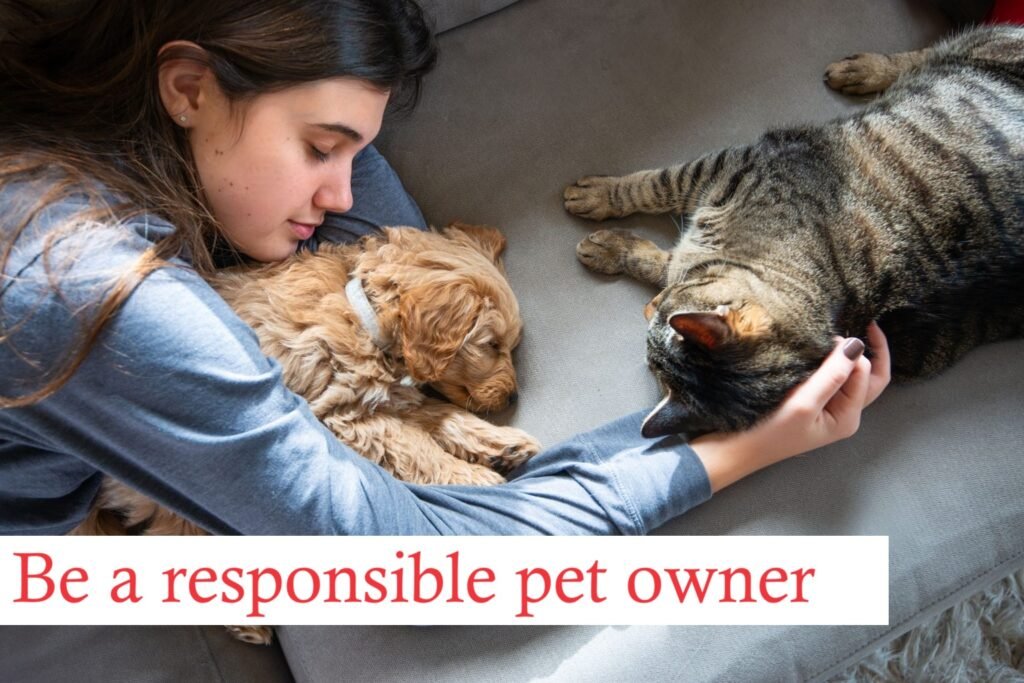Humans naturally love spending time with their pets. Some prefer having quality time with cats, while others love their dogs. Having a pet is a popular hobby and a great way to connect with nature. Did you know that about 67% of people in the U.S. have a pet? This statistic shows how much joy pets bring into human lives. Taking good care of pets is key to their happiness and creates calm and happy homes and neighborhoods.
In this article, we will highlight key responsibilities every pet owner should know to make their pets happy and help them live long lives.
10 Key Responsibilities of Pet Master
Here is the list of essential responsibilities every pet owner must know to ensure their pets’ health and happiness. From proper nutrition to regular veterinary care, learn how to provide the best care for your furry friends.
1- Provide Proper Nutrition

Proper nutrition is crucial for pets as it provides essential vitamins and energy for growth. It boosts their immune system against illnesses and maintains shiny fur, strong teeth, and smooth digestion.
Tips for Providing Proper Nutrition:
- Balanced Diet: Choose a balanced diet that matches your pet’s type, age, and health needs to ensure they receive all necessary nutrients.
- Choosing Food: Opt for high-quality food formulated for their age group; consult a vet for special dietary requirements.
- Feeding Schedule: Establish a regular meal schedule based on the pet’s age and size. Puppies and kittens may need more frequent meals, while adults typically thrive on two meals daily.
- Weight Management: Monitor pet’s weight and adjust their food intake to prevent obesity or undernourishment.
Providing your pet with the right nutrition helps maintain their health and happiness.
2- Ensure Regular Exercise

Exercise is necessary for keeping pets healthy as it helps them stay fit, manage weight, and develop strong muscles and joints. It also promotes mental well-being by reducing stress, anxiety, and boredom, which can lead to behavioral issues. Regular activity makes pets happier and more engaged in their daily lives.
Tips for Regular Exercise for Your Pet:
- Set a Schedule: Plan daily play or exercise sessions to keep your pet active.
- Choose Activities Wisely: Choose activities matching the pet’s age, breed, and energy level. For example, active dogs may enjoy running or fetch, while older pets might prefer gentle walks or indoor play.
- Start Slowly: Begin with short sessions if your pet isn’t accustomed to exercise, gradually increasing time and intensity.
- Use Toys: Incorporate toys like balls or interactive toys to make exercise enjoyable and engaging.
- Monitor Health: Pay attention to how your pet responds to exercise and adjust as necessary to ensure their safety and comfort.
- Stay Consistent: Regular exercise is key to maintaining a pet’s health and happiness. Stick to a routine to keep them active and entertained.
Make exercise a part of your daily routine with scheduled play or walks, aiming for 30 minutes to 1 hour each day. Adjust the duration and intensity based on your pets health and energy levels.
3- Ensure Regular Veterinary Checkup

Routine check-ups are essential for detecting early signs of illness and ensuring your pet’s overall health. Vaccinations protect pets from preventable diseases, while preventive care such as dental cleanings and parasite control helps maintain their well-being.
Tips for Regular Veterinary Care:
- Build a Relationship: Get to know the vet well so you can discuss your pet’s health openly and receive personalized advice.
- Keep Records: Maintain a record of the pet’s vaccinations, medications, and health issues. This helps your vet understand their health history.
- Schedule Appointments: Regularly schedule check-ups and vaccinations as recommended by vet to keep your pet healthy and up-to-date on medical needs.
- Preventive Care: Implement measures like regular teeth cleanings, flea and tick prevention, and provide a suitable diet based on their age and health.
- Stay Informed: Educate yourself about common health issues and signs specific to the pet’s breed or species. This knowledge aids in early detection of problems and prompt veterinary assistance.
Regular veterinary care ensures early detection of health issues and timely interventions, promoting your pet’s long-term health and well-being.
4- Be Careful for Grooming and Hygiene

Proper grooming and hygiene are crucial for your pet’s health and comfort. Regular brushing helps prevent mats and tangles in their coat, reducing the risk of skin irritations and infections.
Tips for Grooming and Hygiene:
- Brushing: Regularly brush your pet’s coat to distribute natural oils and keep their fur clean and healthy.
- Bathing: Use a pet-specific shampoo and lukewarm water for baths to avoid drying out their skin.
- Nail Trimming: Trim your pet’s nails routinely to prevent overgrowth and discomfort.
- Ear and Teeth Cleaning: Clean your pet’s ears and brush their teeth regularly to prevent infections and dental issues.
- Professional Help: Consult a veterinarian or groomer for specific grooming needs tailored to the pet’s breed.
Regular grooming enhances your pet’s appearance and contributes to their overall well-being by preventing health problems and ensuring they stay comfortable and happy.
5- Training and Socialization

Proper training and socialization are essential for a pet’s development and well-being. Training establishes good behavior and strengthens the bond between you and your pet, while socialization teaches them how to interact positively with other animals and people.
Tips for Training and Socialization:
- Start Early: Begin training and socialization when your pet is young to establish good habits and build confidence.
- Use Positive Reinforcement: Reward desired behaviors with treats, praise, or playtime to encourage learning and cooperation.
- Consistency: Maintain consistency in training methods and expectations to help your pet understand what is expected of them.
- Expose to Different Situations: Introduce pets gradually to various environments, sounds, and experiences to help them feel comfortable and confident.
- Seek Professional Help: Consult a professional trainer or behaviorist if you encounter challenges or need guidance with training techniques.
Training and socialization improve your pet’s behavior and enrich their life, making them happier and more adaptable companions in various situations.
6- Provide Safe and Comfortable Shelter

Ensuring your pet has a secure and comfortable shelter is essential for their well-being and happiness. A proper shelter protects them from the elements and provides a space where they can feel safe and relaxed.
Tips for Providing Safe and Comfortable Shelter:
- Choose the Right Size: Select a shelter that allows pets to stand up, turn around, and lie down comfortably.
- Temperature Control: Ensure the shelter is insulated and well-ventilated to maintain a comfortable temperature throughout the year.
- Cleanliness: Regularly clean the shelter and remove debris to prevent health issues and maintain a hygienic environment.
- Safety Measures: Secure the shelter to prevent escapes and protect your pet from potential hazards.
- Comfortable Bedding: Provide soft bedding or a mat to cushion their sleeping area and promote restful sleep.
- Outdoor Shelter: If your pet spends time outdoors, ensure they have access to shade and fresh water, especially during hot weather.
By providing a safe and comfortable shelter, you create a nurturing environment where your pet can thrive and feel secure, enhancing their overall quality of life.
7- Give Time and Attention

Giving dedicated time and attention is crucial for pet’s well-being and happiness. It strengthens your bond with them and fulfills their social and emotional needs.
Tips for Providing Time and Attention:
- Daily Interaction: Spend quality time each day playing, exercising, or simply bonding with your pet.
- Set a Routine: Establish a daily routine that includes regular feeding, grooming, and playtime to provide structure and consistency.
- Show Physical Affection: Express affection through petting, cuddling, and positive reinforcement to build trust and happiness.
- Training and Enrichment: Engage in training sessions and provide mental stimulation activities like puzzle toys to keep their mind active and engaged.
- Observation: Be attentive to the pet’s behavior and needs, promptly addressing any signs of discomfort or distress.
Spending time with pets not only enhances their overall happiness but also nurtures a strong, loving relationship between you and your furry companion.
8- Ensure Financial Commitment
 Committing to the financial responsibilities of pet ownership is essential to ensuring their health, safety, and well-being throughout their life. Here are some tips for managing financial commitment:
Committing to the financial responsibilities of pet ownership is essential to ensuring their health, safety, and well-being throughout their life. Here are some tips for managing financial commitment:
Tips for Managing Financial Commitment:
- Budgeting: Estimate and budget for recurring expenses such as food, grooming, veterinary care, and medications.
- Emergency Fund: Set aside funds for unexpected veterinary emergencies or unforeseen expenses related to pet’s health.
- Insurance: Consider pet insurance to help cover veterinary costs and medical treatments.
- Quality Nutrition: Invest in high-quality food and treats that meet your pet’s nutritional needs.
By planning and budgeting responsibly, you can provide your pet with the care they deserve while ensuring financial stability for both their routine needs and unforeseen circumstances.
9- Responsible for Pet Breeding and Adoption

Engaging in responsible pet breeding or adoption practices is crucial for ensuring the well-being of animals and promoting ethical standards in the pet community.
Tips for Responsible Pet Breeding and Adoption:
- Research and Education: Educate yourself about the responsibilities and considerations involved in pet breeding or adoption, including genetics, health screening, and ethical breeding practices.
- Health and Welfare: Prioritize the health and welfare of both parent animals and offspring by ensuring proper veterinary care, nutrition, and socialization.
- Screening and Selection: Screen potential adopters or breeding partners carefully to ensure they can provide a suitable and loving home.
- Ethical Considerations: Follow guidelines and regulations to prevent overbreeding, promote genetic diversity, and reduce the number of pets in shelters.
- Support Adoption: Consider adopting from shelters or rescue organizations to provide a loving home to pets in need and reduce the demand for pet breeding.
By adopting responsible practices, whether through breeding or adoption, you contribute to the well-being of pets and help foster a compassionate and sustainable pet community.
10- Be Prepared in Case of Emergency

Being prepared for emergencies ensures the safety and well-being of your pet during unexpected situations or natural disasters.
Tips for Emergency Preparedness:
- Emergency Tool Kit: Prepare a pet-specific emergency kit containing essentials like food, water, medications, and first aid supplies.
- Identification: Ensure the pet wears a collar with ID tags and consider microchipping for permanent identification.
- Evacuation Plan: Create a plan for evacuating with pets, identifying designated shelters or pet-friendly accommodations.
- Contact Information: Maintain a list of emergency contacts, including veterinarians and local animal shelters.
- Practice: Familiarize pets with the evacuation plan through practice drills to reduce stress during an actual emergency.
By preparing in advance, you can effectively protect your pet, ensuring their safety and comfort during challenging situations.
Conclusion
Being a responsible pet owner means caring for many important tasks to keep pets healthy and happy. This includes giving them the right food, ensuring they get enough exercise, taking them to the vet regularly, and providing a safe place to live. Moreover, regular grooming, training, and socialization help them behave well and feel good. Spending quality time with pets, planning for their expenses, and adopting pets responsibly are key parts of pet ownership. It’s important to be prepared for emergencies to keep pets safe. Following these simple guidelines and tips, you can ensure your pet lives a healthy, happy, and fulfilling life and enjoy a strong bond with your furry friend.



